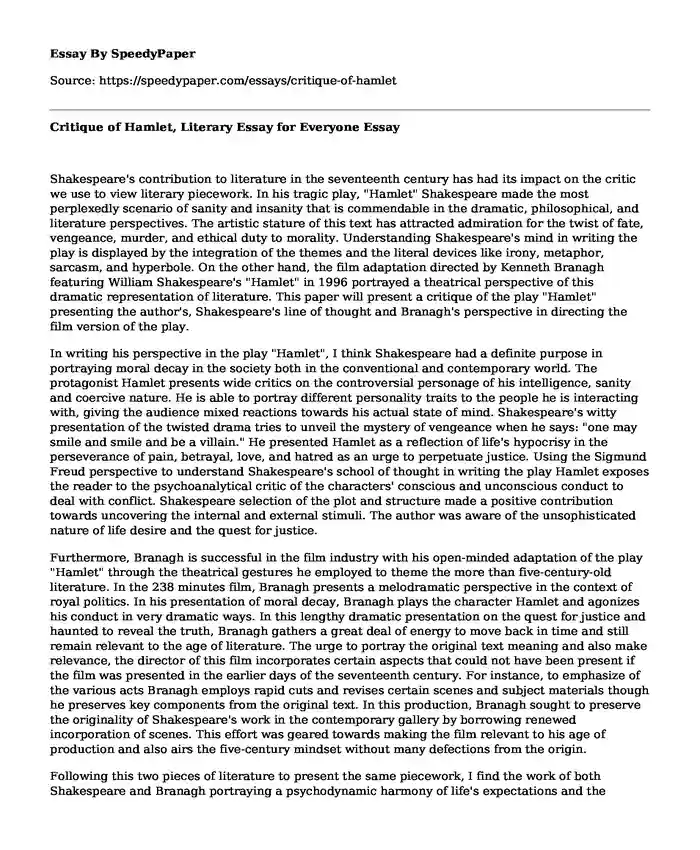
| Type of paper: | Essay |
| Categories: | Shakespeare Hamlet |
| Pages: | 3 |
| Wordcount: | 814 words |
Shakespeare's contribution to literature in the seventeenth century has had its impact on the critic we use to view literary piecework. In his tragic play, "Hamlet" Shakespeare made the most perplexedly scenario of sanity and insanity that is commendable in the dramatic, philosophical, and literature perspectives. The artistic stature of this text has attracted admiration for the twist of fate, vengeance, murder, and ethical duty to morality. Understanding Shakespeare's mind in writing the play is displayed by the integration of the themes and the literal devices like irony, metaphor, sarcasm, and hyperbole. On the other hand, the film adaptation directed by Kenneth Branagh featuring William Shakespeare's "Hamlet" in 1996 portrayed a theatrical perspective of this dramatic representation of literature. This paper will present a critique of the play "Hamlet" presenting the author's, Shakespeare's line of thought and Branagh's perspective in directing the film version of the play.
In writing his perspective in the play "Hamlet", I think Shakespeare had a definite purpose in portraying moral decay in the society both in the conventional and contemporary world. The protagonist Hamlet presents wide critics on the controversial personage of his intelligence, sanity and coercive nature. He is able to portray different personality traits to the people he is interacting with, giving the audience mixed reactions towards his actual state of mind. Shakespeare's witty presentation of the twisted drama tries to unveil the mystery of vengeance when he says: "one may smile and smile and be a villain." He presented Hamlet as a reflection of life's hypocrisy in the perseverance of pain, betrayal, love, and hatred as an urge to perpetuate justice. Using the Sigmund Freud perspective to understand Shakespeare's school of thought in writing the play Hamlet exposes the reader to the psychoanalytical critic of the characters' conscious and unconscious conduct to deal with conflict. Shakespeare selection of the plot and structure made a positive contribution towards uncovering the internal and external stimuli. The author was aware of the unsophisticated nature of life desire and the quest for justice.
Furthermore, Branagh is successful in the film industry with his open-minded adaptation of the play "Hamlet" through the theatrical gestures he employed to theme the more than five-century-old literature. In the 238 minutes film, Branagh presents a melodramatic perspective in the context of royal politics. In his presentation of moral decay, Branagh plays the character Hamlet and agonizes his conduct in very dramatic ways. In this lengthy dramatic presentation on the quest for justice and haunted to reveal the truth, Branagh gathers a great deal of energy to move back in time and still remain relevant to the age of literature. The urge to portray the original text meaning and also make relevance, the director of this film incorporates certain aspects that could not have been present if the film was presented in the earlier days of the seventeenth century. For instance, to emphasize of the various acts Branagh employs rapid cuts and revises certain scenes and subject materials though he preserves key components from the original text. In this production, Branagh sought to preserve the originality of Shakespeare's work in the contemporary gallery by borrowing renewed incorporation of scenes. This effort was geared towards making the film relevant to his age of production and also airs the five-century mindset without many defections from the origin.
Following this two pieces of literature to present the same piecework, I find the work of both Shakespeare and Branagh portraying a psychodynamic harmony of life's expectations and the geniuses of interpersonal relationship on moral ambivalence. The psychoanalytical presentation of the conscious and unconscious quest for vengeance dictates the fate of the character's inner consolation. The two long presentation of the Renaissance drama in the play and the film portray the bondage between family ties, love relationships and the moral obligations. In my view, if the protagonist in both scenarios perpetrated his quest to avenge his father's death immediately, the whole literature work would have lost its role in depicting the moral and theological complexity in the society. The characters traits are best portrayed in the delayed actions to have their moral and religious representation.
In conclusion, making a critique of Hamlet in the text and film perspectives portrays the similarities and advancement of the same literate presentation to transverse the role of morality and religion through the conventional to the contemporary worlds. Both the film and the play show significant elements to modern thinking of the development of personality traits shaped by conscious and unconscious psychological drives of the inner persona.
Works cited
Branagh, Kenneth (1996), "Hamlet" by William Shakespeare: Screenplay and Introduction by Kenneth Branagh; production diary by Russell Jackson. New York: WW Norton
Shakespeare William The Tragedy of Hamlet, Prince of Denmark London, England, early seventeenth century (1600-1602)Shakespeare, W.. Hamlet. In T. J. Spencer (Ed.), The New Penguin Shakespeare. London, England: Penguin Books, 1996.
William Shakespeare (1564-1616) playwright and poet
Cite this page
Critique of Hamlet, Literary Essay for Everyone. (2022, May 22). Retrieved from https://speedypaper.com/essays/critique-of-hamlet
Request Removal
If you are the original author of this essay and no longer wish to have it published on the SpeedyPaper website, please click below to request its removal:
- Social Work Admission Essay Sample
- Free Essay: Family Structure and Juvenile Delinquency
- Arbitration Clauses, Law Essay Sample
- Subaru and Suzuki: SPPS Quantitative Assignment Essay Sample
- Free Paper Comprising the Healthcare Ethics Case Study
- The Center for Disease Control and Prevention (CDC) Human Resources Manual
- Free Essay. Marketing Concept and Marketing Myopia
Popular categories




